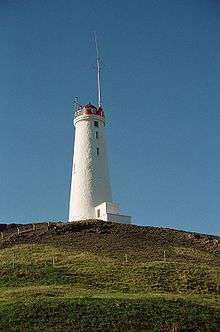Reykjanesviti
 Reykjanes Light | |
 | |
| Location | Reykjanes peninsula |
|---|---|
| Coordinates | 63°48′56″N 22°42′15″W / 63.815673°N 22.704197°WCoordinates: 63°48′56″N 22°42′15″W / 63.815673°N 22.704197°W |
| Year first constructed | 1878 |
| Year first lit | 1929 |
| Construction | concrete tower |
| Tower shape | tapered cylindrical tower with balcoby and lantern |
| Markings / pattern | white tower, red lantern room |
| Height | 31 metres (102 ft) |
| Focal height | 73 metres (240 ft) |
| Characteristic | Fl (2) W 30 s. |
| Admiralty number | L4828 |
| NGA number | 18172 |
| ARLHS number | ICE-048 |
| Iceland number | VIT-001 |
Reykjanesviti is Iceland's oldest lighthouse. It serves as a landfall light for Reykjavík and Keflavík.
History
The tower is a 31 metres (102 ft) tall construction, situated on the southwestern edge of the Reykjanes peninsula.[1] The original structure was built in 1878; just eight years later the building was destroyed by an earthquake. In 1929 the current Reykjanesviti lighthouse, a concrete construction yet with traditional looks, was illuminated. Its focal plane measures 73 metres above sea level.[1]
The light characteristic is "Fl (2) W 30 s.", i.e. a group of two flashing lights every 30 seconds. An antenna for the transmission of DGPS-signals in the longwave range is mounted on the rooftop.[1] There is also a two-story keeper's residence built in the modern area, and the lighthouse has a resident keeper.[1] The lighthouse is located near an area of thermal activity, and steam from this source is often seen in photographs of the lighthouse.[1]
References
- 1 2 3 4 5 Rowlett, Russ. "Lighthouses of Western Iceland". The Lighthouse Directory. University of North Carolina at Chapel Hill. Retrieved 2010-05-17.
See also
External links
| Wikimedia Commons has media related to Reykjanesviti. |